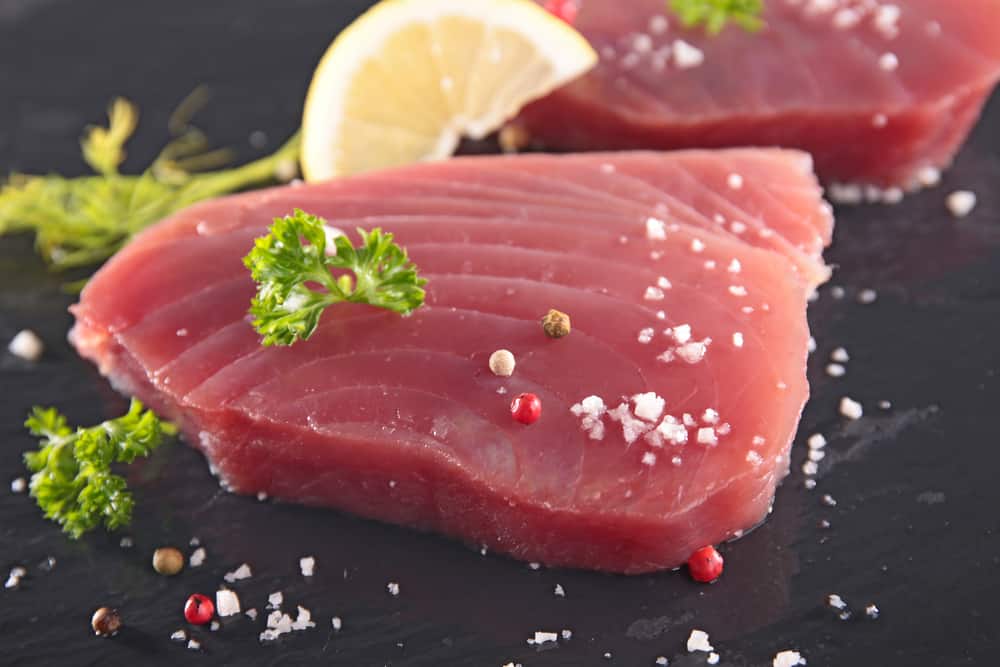It seems impossible to discuss the fishing industry without also discussing the harm caused by overfishing, overburdened waterways, and concerns about mercury contamination. But while some experts are busy evaluating the possibilities for less harmful fishing practices, others are examining another kind of seafood: edible lab-grown fish that require no fishing at all. An article published in Nature late last year cites a few of these innovative companies, including San Diego-based BlueNalu and Hong Kong-based Avant Meats. Read on to find out how lab-grown fish could become the future of protein.
What Is Lab-Grown Fish?
Otherwise known as “cultured” or “cellular” seafood, lab-grown seafood is edible fish derived from the tissue of a living aquatic animal. As the term “lab-grown” might suggest, the product is not the result of slaughter or harvest; rather, the meat is grown entirely in a laboratory setting without having to raise a live animal. The lab-made meat is a complex mix of muscle and fat cells and tastes shockingly similar to live-caught fish. Per Nature writer Emily Waltz, lab-grown fish is based on a technology that originated with other kinds of meat, including beef, chicken, and pork.
How Is Lab-Grown Fish Produced?
As mentioned above, no animals are slaughtered to produce lab-grown fish. Instead, scientists arrange a single layer of cells extracted from a living fish. The cells are carefully combined with glucose, amino acids, peptides, vitamins, and unique growth factors such as hormones. The scientists can then “grow” the cells in a series of three-dimensional bioreactors. The cells eventually form an edible protein structure that appears almost like ground meat. Scientists can produce a similar product using delicate edible scaffolds that take the shape of, for example, a fish fillet. The latter is how companies like BlueNalu and Avant Meats produce a protein that perfectly mimics fresh-caught fish.
Hurdles in the Startup Market
At first glance, lab-grown seafood might seem like the answer to our overfished oceans. After all, if people can enjoy a sustainable, slaughter-free product indistinguishable from their favorite wild-caught fish, why wouldn’t they want to dig in? Unfortunately, there are several hurdles impacting the lab-grown fish market. First, as Emily Waltz explains in Nature, seafood species each have highly distinct flavors and textures that require unique lab-growing parameters. Developing those parameters is incredibly expensive, which can make it difficult for start-up companies to scale. Waltz points out that Wildtype, a California-based cultured seafood operation, has never made more than a few pounds of salmon sushi at a time. Before lab-grown fish can hit the market at large, researchers must lower production costs. In addition, some consumers may feel hesitant when it comes time to try a lab-grown product. These are just a few factors slowing down the lab-grown fish market.
_____
The lab-grown fish market certainly has a long way to go before companies can pilot large-scale protein production. However, a number of companies are already investing millions into this promising endeavor. These operations may well revolutionize the seafood sector for the next generation.
QPS is a GLP/GCP-compliant CRO delivering the highest grade of discovery, preclinical, and clinical drug development services. Since 1995, it has rapidly expanded from a bioanalysis shop to a full-service CRO with 1,100+ employees in the US, Europe, India, and Asia. Today, QPS offers expanded pharmaceutical contract R&D services with special expertise in neuropharmacology, DMPK, toxicology, bioanalysis, translational medicine, and all phases of clinical development. QPS has CLIA-certified and GLP-compliant laboratories ready to fast-track gene therapy, RT-qPCR/QPCR, serological assays, and vaccine development programs. An award-winning leader focused on bioanalysis and clinical trials, QPS is known for proven quality standards, technical expertise, a flexible approach to research, client satisfaction, and turnkey laboratories and facilities. QPS stands tall in its commitment to deliver superior quality, skilled performance, and trusted service to its valued customers. For more information, visit www.qps.com or email info@qps.com.








